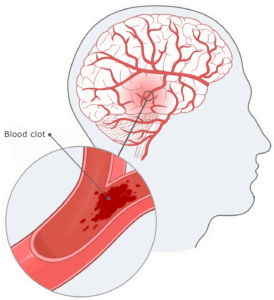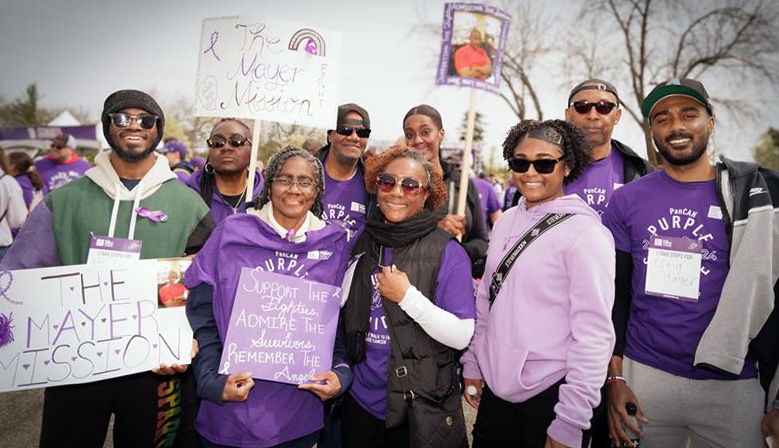Fatima Saunders-Mayer never expected to be at the receiving end of emergent care, especially not during an ordinary workday. A patient access specialist at Hackensack Meridian Mountainside Medical Center, Saunders-Mayer spends her days greeting and registering patients for everything from outpatient lab work to surgeries. But one afternoon, the roles were reversed.
“I had just come back from lunch,” Saunders-Mayer recalled. “I started coughing, and then I couldn’t stop. It turned into regurgitation, and I excused myself to the ladies’ room to collect myself.”
She never made it back to her desk.
“I collapsed,” she said. “Everything happened so fast. My speech was slurred, I lost control of the entire left side of my body, and I started dry heaving. Even though I was conscious and could hear what was going on around me, I was terrified. I couldn’t communicate clearly. I honestly thought I wasn’t going to survive.”
Common and dangerous conditions
Saunders-Mayer was suffering from an ischemic stroke, the most common type of stroke, caused by a blockage in an artery supplying blood to the brain. When blood flow is obstructed, brain cells are deprived of oxygen and begin to die within minutes.
The symptoms came suddenly: slurred speech, weakness on one side of the body, and confusion—all classic signs of stroke. Doctors often use the acronym FAST to help identify stroke symptoms:

- Face drooping
- Arm weakness
- Speech difficulty
- Time to call 911
Fortunately, Saunders-Mayer was surrounded by quick-thinking coworkers who recognized the seriousness of her condition and took immediate action.
“When one of our team members showed signs of a stroke, we immediately called a Code Stroke, just as we would for any patient,” said Michelle Rombough, RN, director of Emergency Services. “In that moment, it wasn’t just about clinical training; it was about caring for one of our own. It was a privilege for our team to be in the right place at the right time to ensure Fatima received the immediate care she needed.”
Compassion and professionalism
Once the emergency team arrived, Saunders-Mayer was treated with professionalism and respect. “They were calm, kind and careful,” she said. “They didn’t rush to tear off my clothes or expose me—they transported me to a private area for evaluation, which I really appreciated.”
After her diagnosis, she was taken to the ICU for observation and care. From there, she transitioned to a regular room as her condition stabilized.
But it wasn’t just the clinical team that left an impression.
“The physicians, nurses, techs, food service staff, even the housekeeping team—they all made me feel seen and cared for,” Saunders-Mayer said. “Everyone was kind and genuine. The food came hot, the rooms were clean, and people asked me how I was doing—not because they had to, but because they truly cared.”
Priorities
To Saunders-Mayer, her job is more than a paycheck. It’s a way of connecting with people. That connection fuels her passion for helping others—and her recovery.

As she recovers, she is reevaluating what matters most.
“My stroke forced me to slow down,” she said. “It gave me a chance to listen to my body and heal at my own pace. I’m focusing on getting strong again, so I can return to the work and hobbies I love.”
And there are many. She loves walking, bowling, traveling, and volunteering. She’s a self-proclaimed “student of life,” always eager to learn something new—whether it’s a documentary or just finding a new route to a store.
“My friends tease me and call me ‘road dog’ because I’ll go anywhere,” she laughed. “But even just getting back to those little things, like being able to go for a walk, is a gift.”
True spirit
Saunders-Mayer believes her experience reflects the true spirit of Mountainside Medical Center.
“As a fairly new employee, most of the staff didn’t even know me,” she said. “They had no idea I worked there. And still, they treated me like family. That tells me everything I need to know about the culture here.”
Her advice?
“Don’t ignore the signs. Know your body. If something feels off, speak up and seek help immediately,” she said. “I’m just thankful I was in the right place, with the right people, at the right time.”
And with every step she takes on her road to recovery, Fatima Saunders-Mayer is proving that even a life-altering event can be a lesson—and a blessing.
To learn more about emergency care at Mountainside Medical, visit our website.

